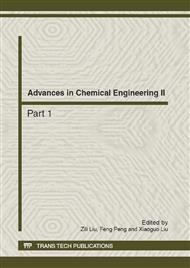p.2981
p.2986
p.2992
p.2996
p.3004
p.3008
p.3012
p.3019
p.3024
Separation of Methanol/Water Mixtures from Dilute Aqueous Solutions Using Pervaporation Technique
Abstract:
The composite polydimethylsiloxane PERVAPTM 4060 was used for separation of methanol/water solutions by using pervaporation technique. The effect of feed concentration, feed temperature, and feed flow rate were investigated for the separation performance. The experimental data showed that increasing of the feed methanol concentration from 0.5 to 10 wt% resulted in an increase in total permeation flux up for to 35 % whilst the separation factor (α) decreased by 85%. The results also showed that increasing operating temperature from 40 to 60 °C caused an increases in methanol permeance up to 130%.
Info:
Periodical:
Pages:
3004-3007
Citation:
Online since:
July 2012
Authors:
Keywords:
Price:
Сopyright:
© 2012 Trans Tech Publications Ltd. All Rights Reserved
Share:
Citation:


